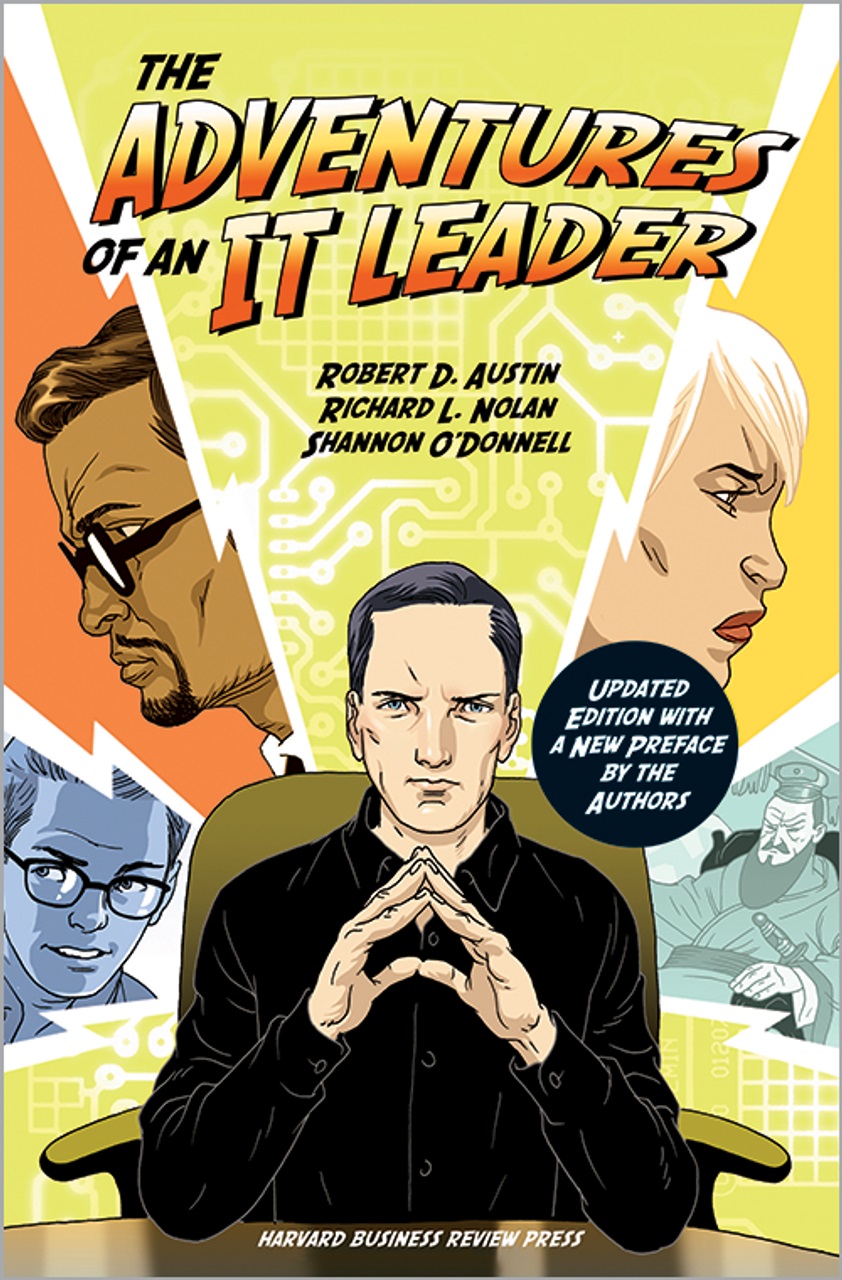IT’s Time for a Change
Richard Nolan reinvents the teaching of IT management with a novel twist on the case method
Jim Barton is the kind of senior executive you might describe as real.
He’s sharp, decisive, driven. But also inquisitive, reasonable, open-minded. Even demonstrates appropriate humility when out of his depth (which has happened a lot lately).
At almost 40, he has a life—dates a management consultant, jogs some mornings, listens to downloads from his nephew, favors a martini at the end of the day.
But lately, he’s been pretty obsessed with work—even to the point of seeking professional counsel from an unnaturally perceptive 20-something tech-nerd who also frequents Vinnie’s, his local home-away-from-home.
Barton can use the advice. Despite an obvious lack of bandwidth for technology, he’s just been promoted from head of loan operations to chief information officer at IVK Corporation, a Boston-based financial services firm.
Of course, Barton is not real. Neither is IVK. They’re the richly detailed inventions of Richard Nolan (BA 1962, MBA 1963, PhD 1965), the Philip M. Condit Endowed Chair in Business Administration at the Foster School, and Robert Austin, associate professor at Harvard Business School. Barton and company are protagonist and setting of the IVK Case Series, a dramatic chapter book of narrative cases on information technology management that invites students to walk a year in Barton’s shoes as he learns, under considerable duress, how to be an effective CIO, the most volatile job in business.
As a teaching method, the IVK Series is no incremental innovation. Nolan intends it to succeed where business schools have struggled since the introduction of computing to industry: to fully engage students in this discipline that is as crucial as it can be incomprehensible. And ultimately, teach how to manage IT well.
Noble cause, novel case
Moments after his initial tumble down the CIO rabbit hole, Barton does what any confused modern human would: consult Google. A search for “IT management” yields more than a billion hits, most pertaining to some technical acronym or other, which proves no help at all.
Ay, there’s the rub: if you can’t define IT management, how do you teach it?
“This is a serious problem at universities around the world right now,” Nolan says. “When it comes to IT management, the academy is essentially bankrupt, for a number of reasons.”
He points to the hyper-evolution of disruptive information technologies, the lack of contemporary, engaging learning materials, and the difficulty of attracting top IT instructors to universities over industry and its more lucrative salaries.
“As a result, there’s a huge variance in the quality and effectiveness of teaching in this subject,” Nolan adds.
Instructors typically address each topic piecemeal, cobbling together disparate cases and articles and books that lack continuity and context. The result is certainly inefficient and often ineffective.
“But IT management is absolutely critical for every organization,” Nolan says. “This is one of the most important issues that the academy and businesses need to address. We need to engage students and managers to give them a deep understanding of IT management that moves them away from trying to master the technologies—which change so rapidly—and to understanding the underlying management issues.”
Right person for the job
What makes this quest substantially more than quixotic is the eminence of its principle author. Nolan possesses both the perspective and the authority to fix the problem.
His five decades toggling between academia, industry and government have been tightly entwined in the ascension of information technology.
As a doctoral student at the UW Business School in the mid-1960s, Nolan studied under William F. Sharpe, winner of the 1990 Nobel Prize in Economics for his contributions to the capital asset pricing model. Sharpe introduced Nolan to computing. And they co-taught IS-300, the UW’s original course in information systems management.
This is a great opportunity for us to do something really significant at the Foster School of Business—to mobilize the academy around this universal problem.
After earning his PhD, Nolan worked as a financial systems manager at Boeing, then taught at the University of Illinois, where he was exposed to the development of seminal supercomputing. In the late 1960s he joined the US Department of Defense as one of Secretary Robert MacNamara’s “Whiz Kids,” brilliant young civilians who introduced systems analysis to military strategy. Afterward, Nolan served 20 years on faculty at Harvard Business School, framing 14 years running his own consulting firm, Nolan, Norton & Company, which guided Fortune 50 companies in the strategic use of computing.
Since returning to the Foster School in 2003, Nolan has continued his active collaboration with Austin, who joined the HBS faculty after ten years as CIO at Ford. “Rob and I have more than 30 years experience,” Nolan says. “We understand the breadth and depth of IT management as well as anyone, and we have embedded the main issues into the cases.”
To help them engage, they brought on Shannon O’Donnell, a research associate at the Foster School with a background in theater.
The plot thickens
The characters and conflict of the IVK Case Series may be fictions, but they’re rooted in fact, real episodes encountered by Nolan and Austin. They chose to set the case in the financial services arena, where IT adds the most value. “It’s where the margins are made today,” Nolan says. “We chose a financial services company to amplify the intangible aspects of value creation.”
Barton begins as the classic tabula rasa, a slate as blank as the white board he gradually populates with the phrases, charts and lists of wisdom earned from each chapter’s lesson. They encompass the IT issues and challenges that face Everymanager: cost, value, priorities, runaway projects, governance, crisis, damage, communication, emerging technology, vendor management, talent, standardization, risk.
The genius of the IVK Series is in the way it wraps these elements of IT management in a story that is, believe it or not, difficult to put down. Try pulling away from Barton’s uncomfortable run-in with his ousted predecessor, who predicts, with glee, “You won’t last a year.” Or dare resist reading to the end when Barton’s handling of a potential customer database breach runs afoul of a wrathful CEO.
“Harvard cases can be somewhat pedantic. They’re too long, with too many exhibits,” admits Nolan, author of many Harvard cases. “This generation learns differently than earlier generations. So, we’ve made our cases shorter and written in a very different tone designed to engage today’s student.”
But the cribbing of dramatic devices from page-turning literature is done for more than effect. The 18-chapter narrative provides instructors a flexible framework, adaptable to one-off seminars, year-long courses and everything in between. “Our cases allow students to access the key issues of IT strategy and leadership,” Nolan says. “And then if we want to go into more depth or look at the issue from a different dimension, we can enhance it with complementary cases.”
Does it deliver?
Nolan hadn’t taught undergraduates in 30 years when he premiered the IVK Case Series last fall in IS 300, the Introduction to IT Management course he helped create at the UW business school in the ’60s. Somewhat surprisingly, this new spin on the old course received rave reviews—from some exacting young critics not accustomed to liking IT management. Foster undergrads found the material “extremely effective,” “enjoyable,” “accessible,” “realistic” and “relevant.”
The series has proven just as engaging when tested on MBAs at the Foster School and the University of Copenhagen, and on executives at Harvard and the UW.
“Young business students know technology but don’t understand why they have to take IT management,” Nolan says. “Older executives haven’t grown up with IT but understand management and the impact of technology.
“What is it that people need to know about IT that’s lasting? The technology itself is fleeting. But the management issues remain constant. That’s what the IVK Series addresses.”
Live together, die alone
Nolan’s ambitions for the IVK Series are transformational. So, in their development, he is broadcasting the cases far and wide as an open-source experiment. Materials can be accessed from the Foster School Web site. And instructors around the world are encouraged to offer comments, suggest amendments, recommend complementary cases, and adapt the series as they see fit to suit the needs of their own students.
“The concept is pretty simple: all of us are smarter than some of us,” Nolan says. “If we all have this problem, let’s engage the entire community of IT management instructors in the academy to come up with a better way of teaching it.”

He, Austin and O’Donnell are submitting a paper outlining this new teaching method to the Academy of Management Journal. Harvard Business School Press will be publishing and distributing the case/chapters and teaching notes, as well as the entire IVK series in a book entitled “The Adventures of an IT Leader.” And Nolan’s grand pedagogical experiment will serve as a central topic of this year’s Seattle Innovation Symposium.
“This is a great opportunity for us to do something really significant at the Foster School of Business—to mobilize the academy around this universal problem,” Nolan says. “Where is there a better platform than Seattle—with Microsoft, Boeing, Amazon, RealNetworks and a heritage of technology innovation—to revolutionize IT management?”
And what better author? In the fifth decade of his multifaceted career, Nolan is leveraging his rich experience and considerable influence in consulting, teaching and research in a bid to leave a resonating legacy that is meant to be distributed as widely as possible.
“I’m kind of running out of runway here,” Nolan admits. “I got involved in IT management very early in my career and have been amazed to see how it’s developed. I believe that the IVK Case Series is a fundamentally new and better way of teaching IT management. I’m really hoping it will make a big difference.”
“The Adventures of an IT Leader” was published in 2009 by Harvard Business School Press. It was named one of CIO Insight’s “Best IT Books of 2009.”
In 2012, Nolan, Austin and O’Donnell followed up with “Harder Than I Thought: Adventures of a Twenty-First Century Leader.” This sequel follows the challenges that Barton faces as he becomes CEO of an aerospace giant in crisis.


